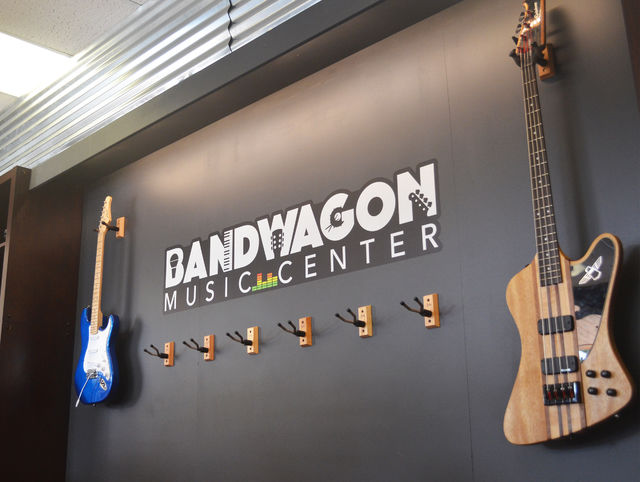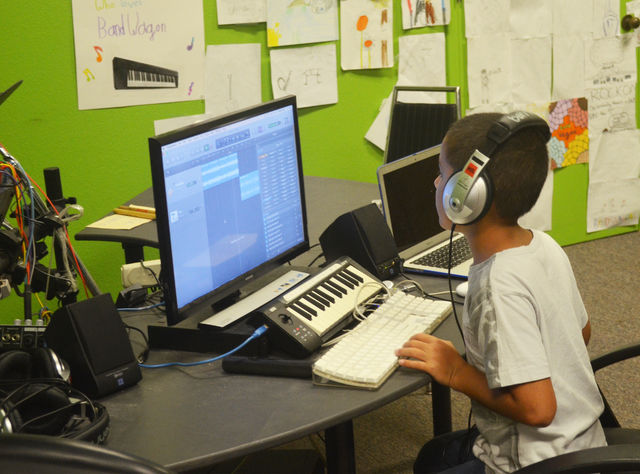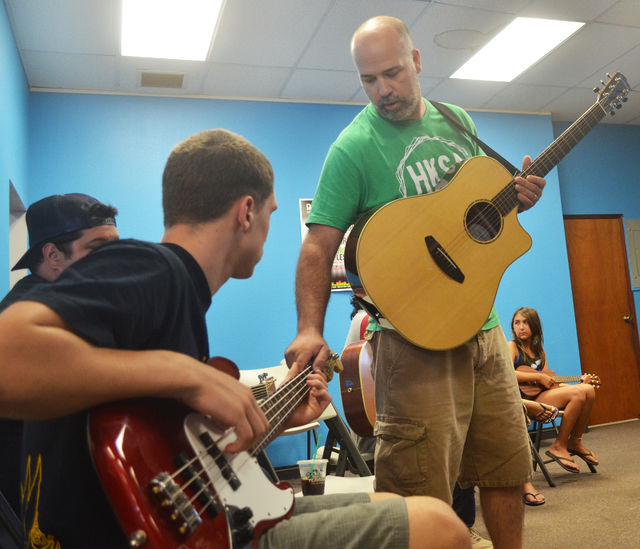Talk Story: Jeremy & Julie Hartshorn
Nothing makes Jeremy Hartshorn happier than teaching keiki how to play music.
“Discovering music has been one of the greatest joys in my life, and it’s rewarding to walk hundreds of kids through the process and seeing them experience the same things I did,” he said.
Hartshorn, along with his wife, Julie, own Bandwagon Studios, a music center in Lihue that gives kids an outlet to jam together.
“Age doesn’t matter once you start jamming,” he said.
Julie added: “It’s fun because it allows for the team aspect of sports for kids who aren’t interested in sports. You can’t be in a band by yourself.”
Monday through Saturday afternoons, members can pick an instrument and jam with their friends.
The center offers programs that give kids between the ages 8 and 17 the chance to learn how to play instruments, from the guitar and ukulele to the keyboard and drums, and in almost every genre.
“Kids are encouraged to find songs they like, and we learn those. As long as lyrics are clean, we’ll do it,” he said.
How did you get into music?
Jeremy: I picked up the guitar at 17, so I had a late start compared to some of these kids. Then I went to college and quickly realized that being able to play guitar, girls would talk to me. So then I started learning fast. And it totally worked; that’s how I attracted my wife. So that’s my success story.
How long have you been open?
Julie: The center opened in October, but we had a bus before then. In 2011, Jeremy got a Hertz bus, gutted it, and put music equipment in it. But this is his true dream — a big facility for kids from all over the island can come to one place. So we literally have Kekaha and Kilauea students coming here, and people who never would go to school together and would never probably run in the same circles now can make music together and have something in common.
Jeremy: I’ve been teaching private lessons for 20 years, and there were a lot of plot holes I saw when I was doing that. Like, we were in someone’s living room and their dad is watching sports, and doesn’t want to turn it off, or the little brother is there, and their mom is hovering behind them, or the dog’s barking.
Then when you finally get them playing, you can’t take them anywhere, because at that point, the best thing to do would be to find other kids for them to jam with. Because playing music by yourself is boring. It’s a lot more fun when you have someone else to play with. Scheduling was always a nightmare, too. I spent time I could be teaching driving from house to house.
I also had a home studio, and I had a group of kids who started coming to my home studio. They formed a band called Paradox Lockdown. I noticed, because I already had the gear set up, that the group learned exponentially fast.
Then I started thinking that I needed to build a center or have a store where we can have the space for kids to come and play together. But I couldn’t figure out how to do it, or I didn’t have the funds to do it. That’s when I got the idea to put in on wheels. I saw the inside of the bus, and realized it was big enough to house a studio. I had that for about four years. The bus was cool, but it was hard to staff. The kids were limited by the knowledge only I could share, and I could really only take four kids at a time. Otherwise it got crowded.
Now, Bandwagon provides a space to learn, friends to learn with, equipment to use, band mates, a centralized place to meet, and it’s plug and play.
How is Bandwagon run?
Julie: It’s like a CrossFit membership. So the kids come in, and they’re trained on all the instruments, just like in CrossFit, you’re trained in everything you do. The kids come whenever is convenient for them between the hours of 2 and 5:30 p.m. A lot of our membership has a lot of other activities they do after school and this is one of them. We have a Saturday program, which is for all ages. We don’t have any classes that day; it’s an open jam session. That’s when we do little kid and adult classes.
Jeremy: We also have band coaching, which is like coaching a sports team — the same group of kids show up at the same time every week, and have a mentor who is responsible for them. It’s a service we offer that’s different than the membership. Once kids make friends and establish a crew they like to work with, we steer them to band coaching.
How did you see a need for it on Kauai?
Jeremy: People are interested for music for their kids everywhere. I did this in California and when I moved here, within a week, I had a full roster of people who wanted music lessons. Kauai is notorious for not having things for kids to do, especially on a rainy day. Not only that, but as parents of four kids, we understand the value of having a safe, positive environment for your kid to be. Let alone, a place where they’re learning a life skill, like music.
Our philosophy is “All kids, all instruments.” So we take a kid who identifies himself as a guitar player, and we move him down the field until they begin to think of themselves as an all-around musician. We don’t let them settle for one instrument. “All kids learn all instruments” is a big part of what we do.
Why “all kids, all instruments” as a philosophy?
Jeremy: First of all, most of the top musicians are multi-instrumentalist. Second of all, learning one instrument makes you better at all the other ones. And, at a certain point, you can put an instrument in a kid’s hand that they hadn’t seen before, and give them a few minutes, and they’ll figure it out, based on their knowledge other instruments.
Julie: Also, we learned that kids can hit a wall with one instrument, and that’s where private lessons fall. Here, we take that natural “I’m tired of this particular thing” and roll it into the next one. It alleviates the pressure cooker of “This is the only thing I can do.” Jeremy’s vision is for kids to play together, so being able to play what the person across the stage is playing really helps you communicate with them effectively.
Who provides equipment?
Jeremy: I had a stockpile from my previous endeavors. But people have brought us instruments because they say it’ll get better use here.
Julie: We had someone walk in this week, a grandpa of one of our students, wanted to make sure his guitar went to a good cause; he didn’t want to sell it. I could tell it was his love. It’s that sort of love that people are pouring in and doing what they can.
Do the kids have music experience already?
Julie: We have quite a spectrum; people who have kids who have been playing for years and others who never picked up an instrument.
You do all these programs, but you also record, right?
Jeremy: That’s something I do apart from Bandwagon. It’s not something I pitch hard as what we do. We do have a recording facility there, so groups at rock band can record. I’ll point studio out to people, but it’s not part of normal membership program. But if a group of kids want to record something, they can book time.
Has the community been supportive of the center?
Jeremy: Thanks to the generosity of certain individuals who really believe in what we’re doing, we’ve been able to do some financial assistance for people, even though we’re not a nonprofit.
Part of the origin story on this is that Kauai Christian Fellowship has a camp called Rock U, which was the template that helped me figure out what to do with Bandwagon. Rock U happens every 18 months, and we take over the whole church facility and fill it with music gear. Kids would camp out there for the whole weekend, and were so excited to play together and to have a venue to play for their families. But it was crickets after it was over because it was like “Now what?” So I wanted to create a place that was like Rock U, but all the time.
Do you have any plans to expand?
Jeremy: The next phase is to establish an outpost on the North and South Shores at local church campuses. We would rent out one room in a facility, and members can go to whichever place is closer. That will open in August.
We’re also going to be establishing city bus chaperones whose job it would be to accompany kids on the bus to get them to and from the center.
What has been the most rewarding part about opening Bandwagon?
Jeremy: When you see a kid find their thing, and then just explode.




